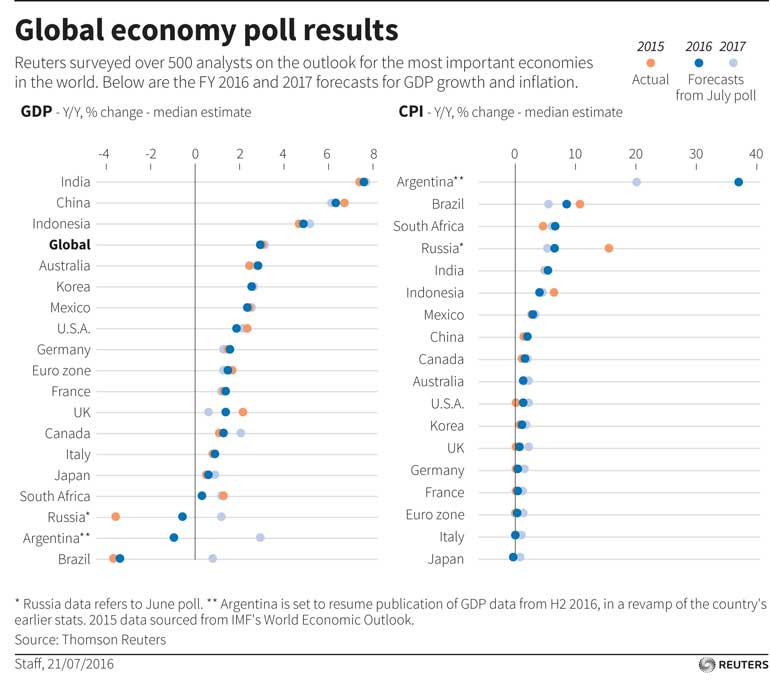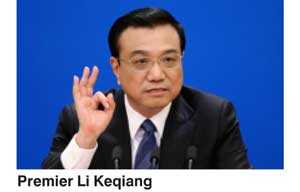Thursday Feb 19, 2026
Thursday Feb 19, 2026
Monday, 25 July 2016 00:00 - - {{hitsCtrl.values.hits}}
 Reuters: The world’s leading economies will step up efforts to lift global economic growth and share the benefits more broadly, top policymakers meeting in China said on Saturday, as they seek to counter growing dissatisfaction with globalisation.
Reuters: The world’s leading economies will step up efforts to lift global economic growth and share the benefits more broadly, top policymakers meeting in China said on Saturday, as they seek to counter growing dissatisfaction with globalisation.
Finance ministers and central bankers from the Group of 20 are huddling in China’s south-western city of Chengdu to discuss how to confront global challenges exacerbated by Britain’s decision to leave the European Union.
The spectre of protectionism, highlighted by US Republican presidential candidate Donald Trump’s “America First” rhetoric and talk of pulling out of trade agreements, also hangs over the meeting.
“The recovery continues but remains weaker than desirable. Meanwhile, the benefits of growth need to be shared more broadly within countries to promote inclusiveness,” the G20 ministers said in a draft communique seen by Reuters.
US Treasury Secretary Jack Lew said on Saturday it was important for G20 countries to boost shared growth using all policy tools, including monetary and fiscal policies as well as structural reforms, to boost efficiency.
“This is a time when it is important for all of us to redouble our efforts to use all of the policy tools that we have to boost shared growth,” Lew told reporters.
Chinese Finance Minister Lou Jiwei called for more coordination to promote sustainable growth, as fiscal and monetary tools were becoming less effective at spurring economic activity.
“G20 countries should increase policy communication and coordination, form policy consensus and guide market expectations, making monetary policy more forward-looking and transparent and increase the effectiveness of fiscal policy,” Lou said.
Brexit
The G20 meeting was the first of its kind since the Brexit vote and a debut for Britain’s new finance minister, Philip Hammond, who is likely to be grilled about the UK’s plans for keeping up economic growth in the wake of Brexit.
The International Monetary Fund this week cut its global growth forecasts because of the Brexit vote, saying that uncertainty over Britain’s future trade relationship with Europe will stall investment and sap consumer confidence.
Data out of Britain on Friday seemed to bear out fears, with a business activity index posted its biggest drop in its 20-year history. And Hammond said on Friday the UK could reset fiscal policy if necessary.
European officials were keen for more information.
“Brexit has already had an impact. All international organisations and governments are revising downwards their growth projections due to Brexit-related uncertainty and impact on demand. So this is already a problem,” Italian Economy Minister Pier Carlo Padoan told Reuters.
“I hope that there is going to be clarification about the timing and process of the divorce. The sooner the better so this generates a new equilibrium.”
French Finance Minister Michel Sapin said even though Britain was not prepared for Brexit, its response time should not be indefinite.
Currencies
Lew, in a bilateral meeting with Japanese Finance Minister Taro Aso, reiterated the need for G20 members to refrain from competitive devaluations.
Regarded as a safe haven at times of market turmoil, the yen JPY= strengthened to around 100 to the dollar after the Brexit vote, much to the chagrin of Japanese officials, although it has since eased back to around 106 per dollar.
Markets are speculating about a further expansion of the Bank of Japan’s massive stimulus program at a 28-29 July policy review, with the yen’s strength this year hitting exports and undermining efforts to escape deflation.
Bank of Japan Governor Haruhiko Kuroda said on Saturday he would ease policy further if necessary to achieve its 2% inflation goal, but again shrugged off talk of the BOJ taking the radical policy step of “helicopter money.” “If it means that central banks are directly underwriting government bonds, or managing monetary and fiscal policies as one, that would be prohibited in Japan as well as other advanced economies, as lessons from history tell us,” he said.
 AFP: The world cannot depend on China alone to save it from a Brexit-induced downturn, the country’s premier said Friday.
AFP: The world cannot depend on China alone to save it from a Brexit-induced downturn, the country’s premier said Friday.
Li Keqiang made the remarks after meeting the heads of six global economic organisations, days after the IMF predicted that uncertainty created by Britain’s vote to leave the European Union would slow the world economy into next year.
“Given the financial fluctuations as a result of Brexit, China will advance market-based reform of its exchange rate,” Li said, adding, “we will not engage in a trade war or currency war.
But “it is impossible to carry all of the burden of the whole world on our shoulders,” he said.
Improving global economic growth would require the world to step up macroeconomic coordination and increase the transparency of macro policies, Li added. In an update to its April forecast, the IMF said global economic growth was likely to be 3.1% this year and 3.4% in 2017, a downward revision of 0.1% for both years. At the same time it upgraded its growth forecast for China by 0.1% to 6.6.
The Asian giant’s economy expanded at 6.7% in the April-June period, the same as the first three months of the year and slowing from a growth of 6.9 for the full year 2015 – its weakest annual rate in a quarter of a century.
But the second-quarter reading was stronger than expected and fuelled hopes that growth in the world’s second-largest economy may be stabilising.
Li said the IMF hike put “pressure” on China to “maintain growth and stability,” adding that the organisation should “encourage all countries to move in the same direction”.
Following Li’s comments, World Bank president Jim Yong Kim praised China for its commitment to international economic cooperation at a “time when in the West there is a very loud rejection of globalisation and multilateralism”.
The remarks come as Beijing finds itself in a dispute with the EU over whether or not it deserves to be granted market economy status, a designation that would make it much harder for major economies to fight Beijing over alleged unfair trading practices.
Li’s meeting came ahead of a G-20 finance ministers summit in the Chinese city of Chengdu, where representatives from the biggest industrialised and emerging economies are expected to discuss the impact of Brexit.